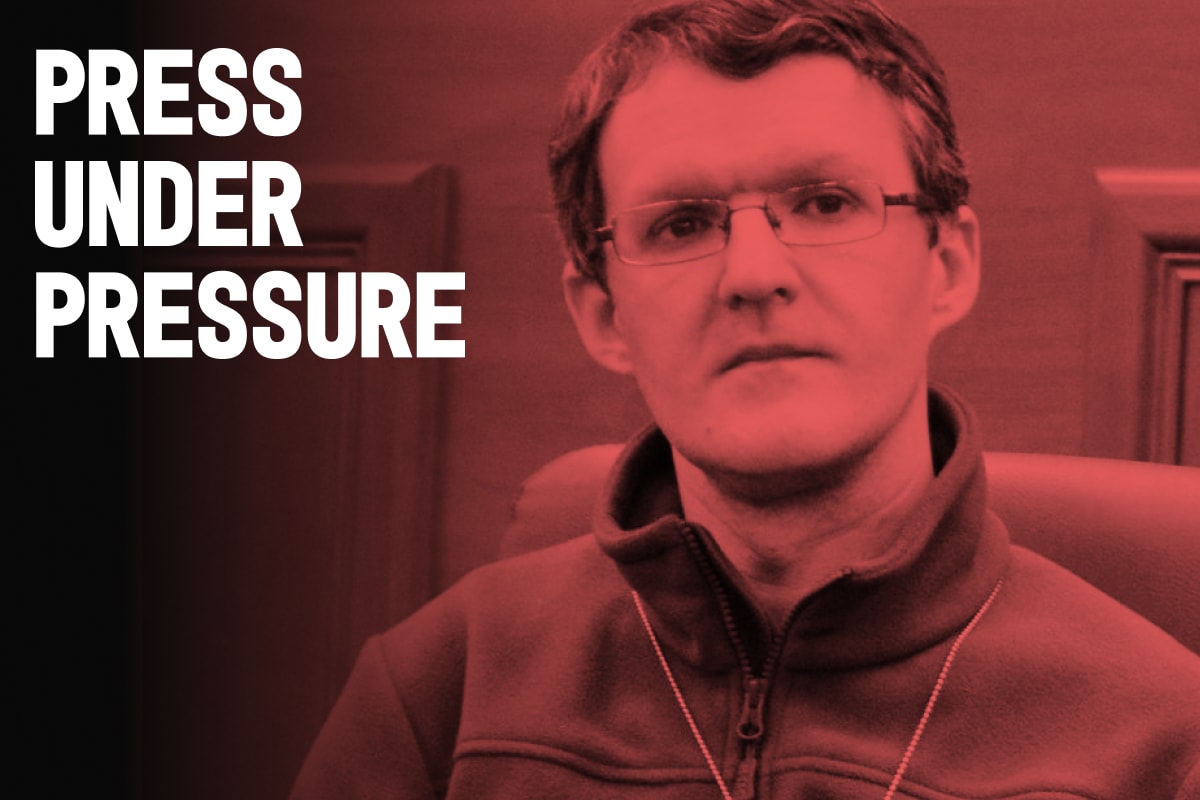
Dzianis Ivashyn was detained on March 12, 2021, in Hrodna by KGB officers. He was accused of ‘interference with the actions of an internal affairs officer’. Six months later, ‘treason’ was added to the first accusation. The journalist’s story is told by his colleagues and family.
He is known for his investigations of the Russian World influence in Belarus and Syria, of the notorious restaurant built near Kurapaty in Minsk, as well as of the former Ukrainian division Berkut officers employed by Belarusian law enforcement.
The journalist had a heart attack in prison. He was placed in a disciplinary cell at least five times. Dzianis received no letters, and no letters from him were sent. His relatives are denied visiting. Human rights defenders recognized Dzianis as a political prisoner.
On September 14, 2022 Dzianis Ivashyn was sentenced to 13 years and 1 month of reinforced regime colony. The political prisoner was also imposed a fine of 150 base values (approximately 4,800 BYN, or about 1,900 USD). Besides, Ivashyn must pay moral compensation to nine aggrieved, each person – 2,000 BYN.

Dzianis and I met over seven years ago, almost by accident. I was detained handing out flyers at a rally in support of the Ukraine which I organised, a court hearing was scheduled. And he learned about that rally and got interested in who I was, why he had never heard about me before. He found me on Facebook and later we met at Mova Nanova courses. We started dating almost immediately.
I liked Dzianis since minute one for he is open, generous, honest. He respects his work, he is certain he does something worthy and necessary.
Journalism, search of information and its analysis have always been a huge part of his life. I sometimes argued and complained that Dzianis spends far less time with me.
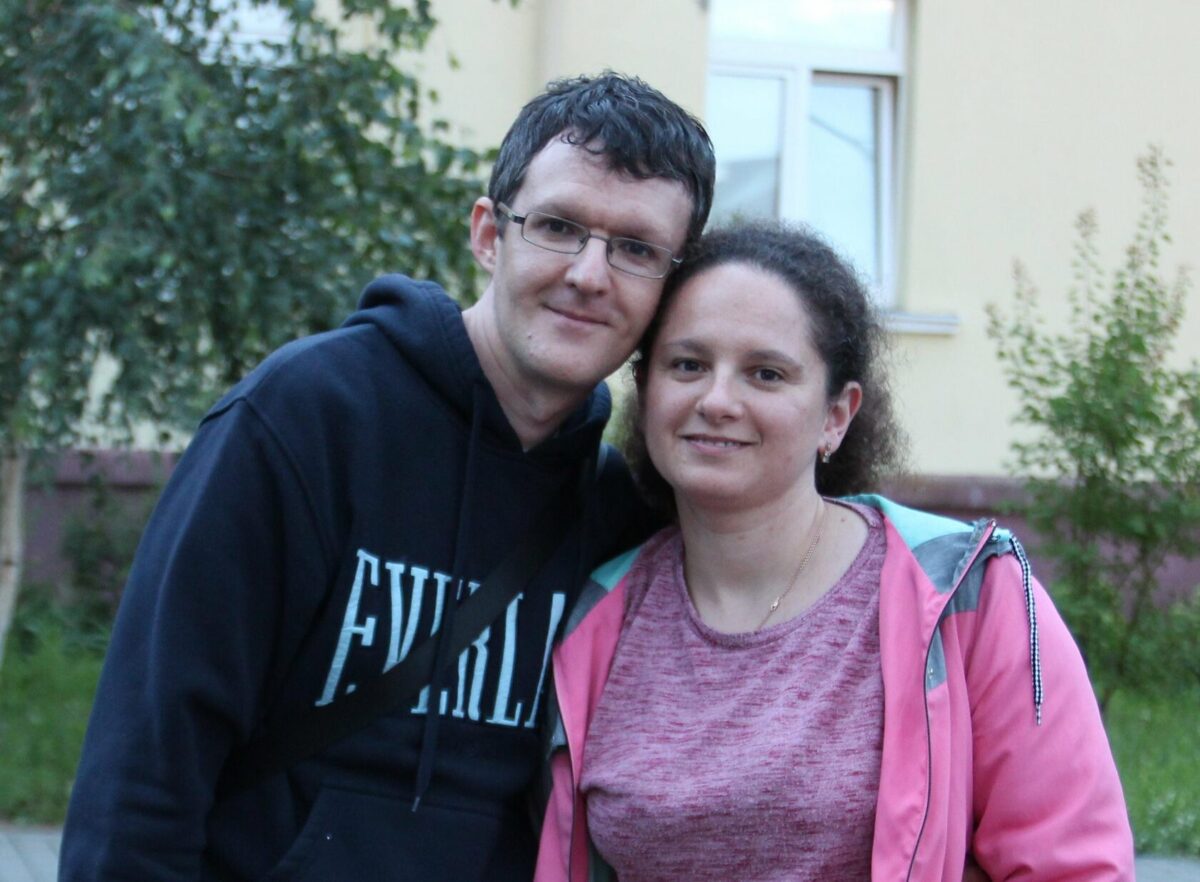
Photo: Volha Ivashyna’s Facebook page
There are problems with letters, serious ones. Letters from him and from us have not been delivered in over two months. They stopped accepting my letters lately. I tried to work this problem out. I was notified that almost all the letters I’d sent were taken in. Yet it’s a big question whether Dzianis would receive them. They respond to all my complaints in the same way, ‘Everything is fine, we pass everything on.’ But Dzianis receives nothing. I don’t know where else to submit my complaints. There was a suggestion to go to court, but we’re not there yet.
We know very little about what is happening to Dzianis in there. Telegrams don’t reach him as well. They take packages for him, unless he’s in the disciplinary cell.
As far as we know, he is put in the disciplinary cell for minor violations of the regulations which other prisoners get no punishment for. And he gets ten days for each fault.
Neither do we know what to expect from the investigative bodies. Anything can happen at the court, yet there has been no word about the court so far. It is not those bodies’ initiative, in principle, it’s a direct order from above. Everything goes in line with the instructions from above.
I don’t know whether there is sense in writing letters if they don’t reach Dzianis. Another option is money transfer or packages, they should pass them.

Dzianis became really interested in journalism after Maidan; he worried for Ukraine very much… Dzianis’ father is Ukrainian, he has a foreign Ukrainian card. He took off to the Ukraine at the time, stayed there for about three weeks. I was so nervous! I could not leave the computer and watched live coverage of the events.
In Kiev, he met guys from InformNapalm to follow Russian aggression in the Ukraine. They searched for bits of information in the open sources using the OSINT method and brought the truth to the people.
Dzianis started with translations at first, studied there. Then he started writing about Belarus and got consumed by this work. He spent days searching for information.
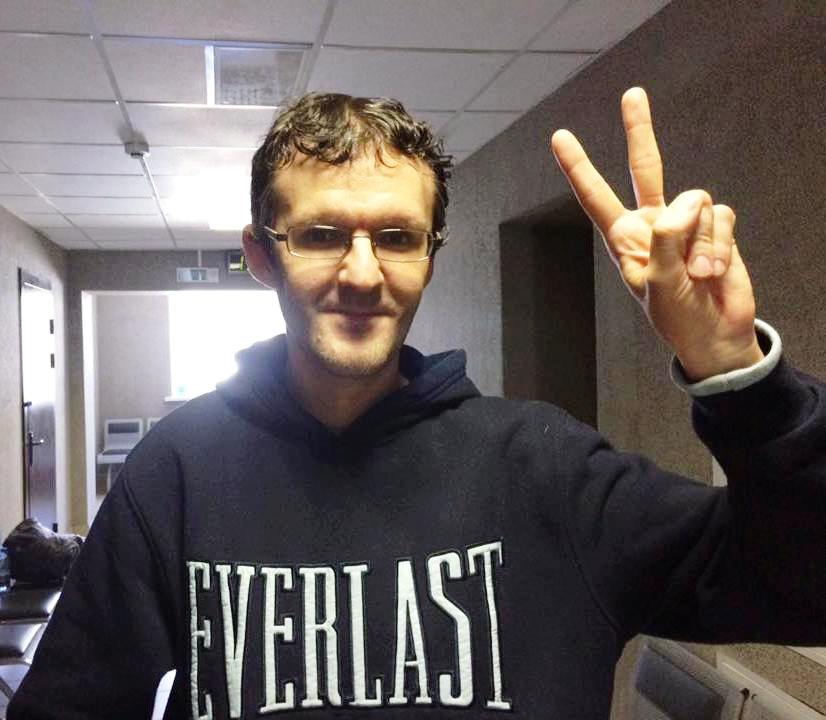
Photo: Volha Ivashyna’s Facebook page
Dzianis was subjected to serious pressure in prison. They had some sort of ‘talks’ regularly, without his lawyer present; they transferred him from one cell to another. We can only guess what was the nature of those ‘talks’.
We were shocked to know that Dzianis had a heart attack in prison. He has never had any heart problems. Besides, he is very reserved and calm, he has never shouted or insulted anyone or swore. And then this heart attack!
All this torture stopped once we started talking about it, after his heart attack, after him being put in the disciplinary cell. So I’m sure: they are afraid of publicity most of all.
We haven’t received a letter from Dzianis for over two months. I suspect someone forbade it. Without the right to correspondence.
I visited the deputy chief of prison and tried to find out why the correspondence stopped, and tried to appeal to their conscience. But they only look you in the eye and stay silent.
Dzianis wrote very touching letters. Read one a hundred times and cry a hundred times. He supported us in his letters, soothed me, ‘I live here, Mama. I make my living here, accept it and don’t worry, don’t think about it.’ But how can I?
Six months after the detainment, they made the second accusation. No investigative actions were taken, except for those ‘talks’. They, probably, had to establish whether to release him. So they decided to add ‘treason’, Article 356 of the Criminal Code.
Yet we learned about it later. Everything was classified, the lawyer is under the non-disclosure obligation. We submitted appeals, asked to explain what Denis is being accused of. I don’t know how many attempts we’d made before we knew the number of the article. Why hide this?
It is quite difficult to help in a situation like this. It will be nine months soon. No letters, no visits. We only have to hope the regime will fall and all the innocent will be released. And Dzianis will write a book for the future generations: about the things happening in today’s Belarus.

I have known Dzianis Ivashin for almost thirty years, since school.
The main thing that made Dzianis become a journalist was that he went to the Revolution of Dignity, Euromaidan in the Ukraine. Dzianis started to work with InformNapalm: he started as a volunteer journalist investigating for the medium and then became the editor of the Belarusian version of the website.
To tell the truth, I would never expect Dzianis to become an investigative journalist. It’s one thing to write articles about everyday life and political issues. And preparing large-scale investigations with data requests, including to the foreign agencies, is a completely different one. I was really moved by his work.
Dzianis criticised things that happened in Belarus in the past year. He was going to make an investigation about Sviatlana Tsikhanouskaya, Viktar Babaryka, a big political review. He couldn’t make it in March.
Speaking about Dzianis as a journalist, I would say he is principled, thorough, precise. And as a person he is honest, responsible. He is very picky when it comes to friends. He has very few of them, but once a friend, forever a friend.

Dzianis Ivashyn and Andrei Mialeshka. Photo provided by Andrei Mialeshka
I was waiting for the outcome of the search at the door of his flat. I thought they would release Dzianis soon because the cases they opened on him are worthless.
He has always worked honestly, he used open sources, submitted official requests to various institutions, received responses and wrote articles only based on those. So the only thing I can say about his first criminal case (Article 365 of the Criminal Code of the Republic of Belarus ‘Interference with the actions of an internal affairs officer’ – Ed.) is, ‘You were the ones who gave the information, people.’
Dzianis has simply been a hostage for several months already. I consider this as pressure on the Ukrainians, for Denis has a foreign Ukrainian card, he knows many Ukrainian journalists, he took part in a lot of conferences. They want to make him some criminal he is not.

I met Dzianis when he worked for InformNapalm. We sometimes printed his pieces he posted on social media. It was very interesting at the time: he investigated Russian military activities, its military presence in Donbas and Ukraine in general. The year 2014 was a hot topic back then. Later, he joined our editorial office, started investigating Belarusian issues.
Dzianis is very professional in his investigations. He would never publish unverified information, he selects his words carefully. If not 100% sure, he would put the word ‘allegedly’ in his materials.
He conducted an open source investigation of the Poedem Poedim restaurant in Kurapaty. Despite all the lawsuits the owners of the restaurant initiated against Novy Chas. We basically won all the lawsuits: one clean and the other was not Denis’ error, but the copy editor’s who used the material on this restaurant from our source.
This situation showed how careful Dzianis was with presenting material, verifying it. We managed to win the trial in the given circumstances even considering the lawsuits and who the founders of the restaurant were. I think it’s a proper recognition of Dzianis as a journalist, an investigator; an indication of his professionalism, of the quality of his work.
At Novy Chas, we made four to five minute movies based on Dzianis’ articles: Dzianis narrated the corresponding video sequence. I was present during the production of these movies. The narration took four, five hours sometimes because Dzianis was very thorough. He said, ‘No, this word doesn’t fit here, let’s do it over’ or ‘Well, we’re not really sure, let’s use other words, I’ll read the sentence again’ or ‘We’re not quite sure about this, I’ll say «probably», «most likely».’
It was quite amusing, watching Dzianis during production when he constantly clarified every little thing so that each word would take its place, so that no one could pick on anything.
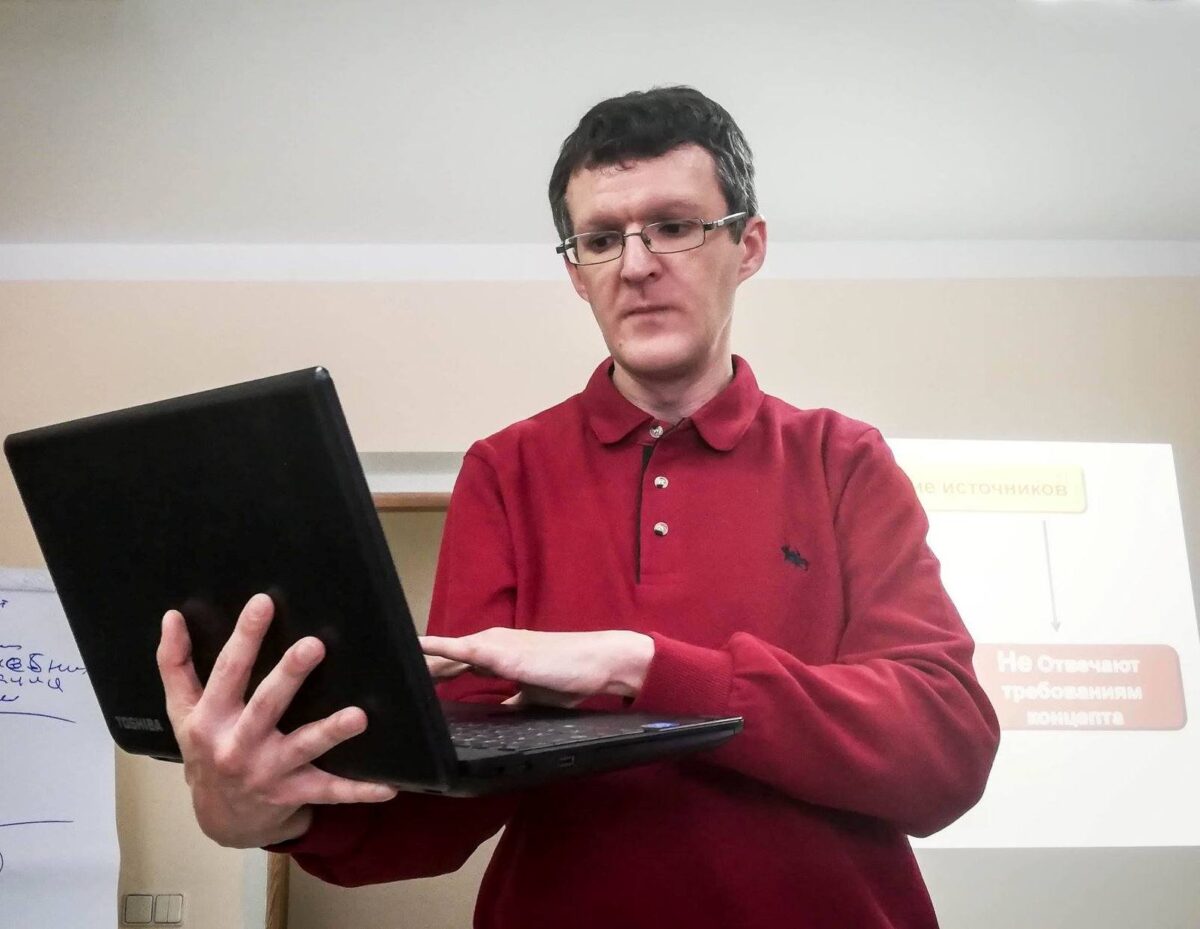
Photo: Volha Ivashyna’s Facebook page
There is and there was no correspondence with him whatsoever. He is completely isolated. I received no response to any letter I wrote to him. When Novy Chas was still printed we sent it to Dzianis to the pre-trial detention centre. No response to that either. I mean, he might have written to us, but none of those letters were passed on. And we still don’t know whether he received the newspaper.
It is obviously revenge on Dzianis. For his latest investigation about the Ukrainian Berkut officers employed at riot police divisions in Minsk. It is obvious because he is accused under the corresponding articles.
What we know: he is accused of alleged disclosure of information about police officers. This is a lie because Dzianis has always conducted all his investigations using the OSINT method: from open sources only, he never used any secret information. He worked with the open information, systematised it and made conclusions. Such, for example, was information from the Minsk City Executive Committee website or that of the Ministry of Internal Affairs. If anyone should be accused under those criminal articles, it should be the governmental bodies publishing information on the Internet for Dzianis to use.
There is no body of crime here, in my opinion, however, it’s ‘sometimes we can’t worry about the law’ times in our country.

Dzianis is very witty, thorough. Investigations are his element. He can work with large amounts of information, find things, select data, analyze it. He has always worked with open information: all his investigations were based on open sources. He used records from the unified state register, from official institutions, everything available in open sources yet not easily noticed. Dzianis could notice the information he needed, collect it, crystallise it.
His series of investigations of Kurapaty cost him and the editorial office two lawsuits. One of them we won, the other one lost in part. Yet we rather lost due to the unprofessionalism of the person who posted the material on the website, which wasn’t even our own material, but a reprint. We missed a time inconsistency and it cost us subpoena payment. No claim was addressed to Dzianis directly.
He tried to be responsible about his texts. All the topics he covered were clearly not, so Dzianis’ materials were read several times at the editorial office. And some parts could be coordinated with our lawyers to avoid claims in the future.
Dzianis is a generous, friendly person ready to help, a very principled one. It could sometimes be a bother because he is youthfully maximalist. Sometimes things should not have been said, yet he couldn’t hold himself.
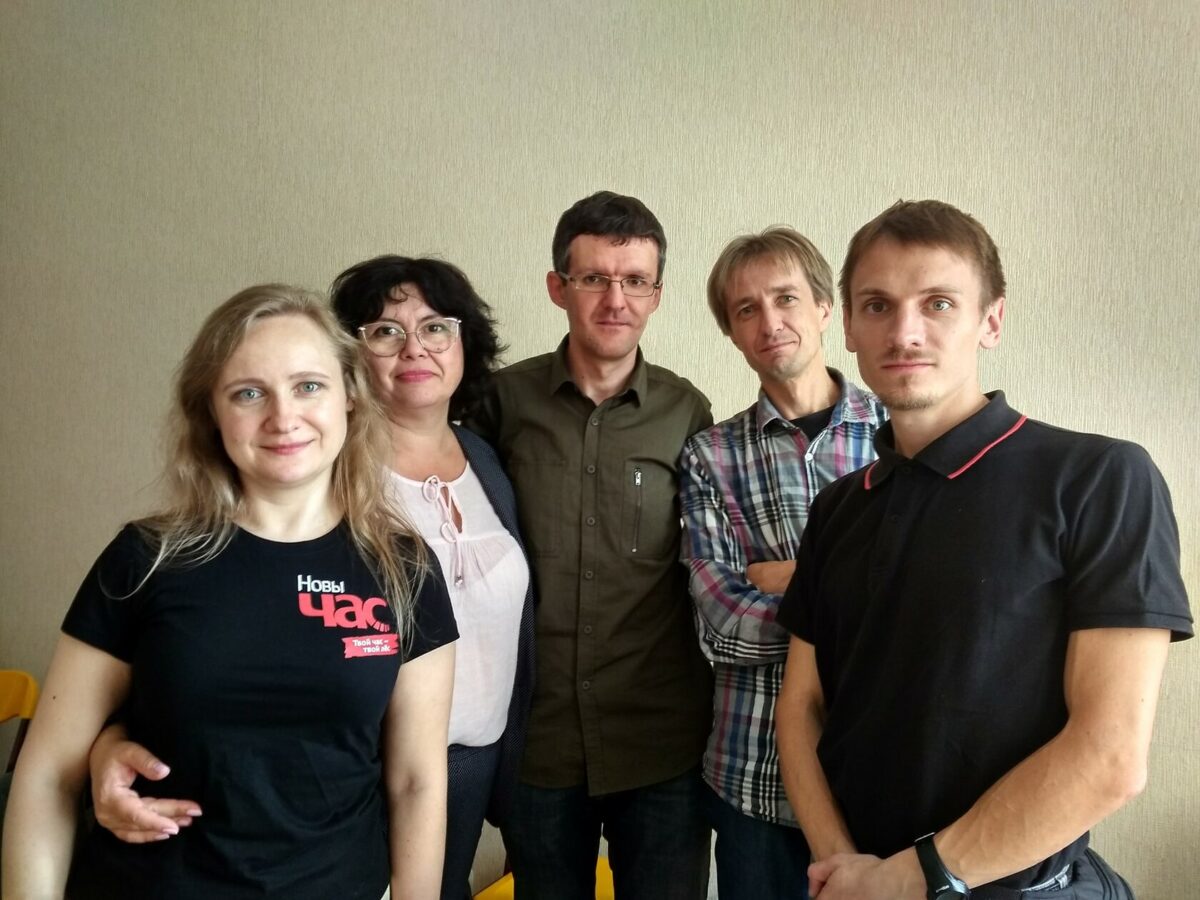
Photo: Volha Ivashyna’s Facebook page
«We can only guess what was in the fourth part of the investigation of the Berkut officers»
Dzianis was detained at the time of another run on Ukraine. We were told that insurgents were being prepared, security services were working very hard. Dzianis gave a commentary and the journalist asked him whether the SBU officers contacted him about his investigation. Dzianis said plainly that they did not, yet he applied to them to obtain some information about the Berkut officers who appeared in Belarus. But it was given in a different context at the time, so I think it became a trigger. And then— well, the main task is to capture a person…
The authorities were not happy about the investigation of the Berkut officers. Three parts thereof were published, Dzianis was working on the fourth one. He had already collected the materials and only needed to process them. He said this fourth part would have an even bigger impact. ‘I’m already working, it’ll be ready soon’, he said.
The fourth part was never published, we can only guess what was in it. They probably seized all the materials. Yet everything is in the open, Dzianis used a lot of information from the MIA website.
There is virtually no correspondence with Dzianis, almost no letters reach him. I think I received only one letter from him, a while ago. His relatives pass on rare words from him: greetings, gratitudes and support.
He didn’t receive the Novy Chas newspaper, not once, even though we subscribed him. They showed him several issues when the paper was still printed, but didn’t give it to him. His wife submitted complaints, they responded that the paper is an extremist one and they would not give it to him.
If I met Dzianis, I would say, ‘Come back to work, we need you.’
Terms and conditions
Partial or full reprint is permitted subject to following terms of use.
An active direct hyperlink to the original publication is required. The link must be placed in the header of the reprinted material, in the lead or the first paragraph.
Reprints, whether in full or in part, must not make changes to the text, titles, or copyrighted photographs.
When reprinting materials from this page, attribution must be given to the Press Club Belarus “Press under Pressure” project, collecting evidence of repression against independent media and journalists in Belarus.